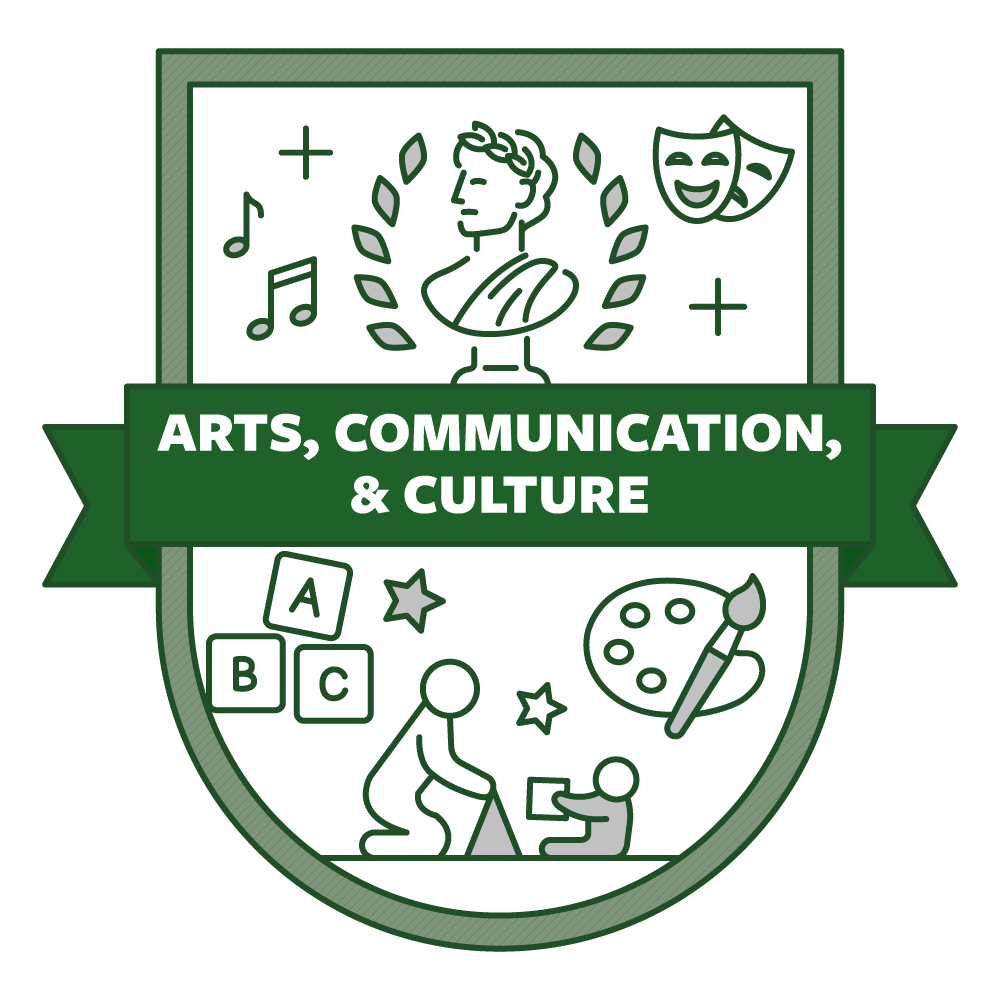Courses Offered at
Woodland Campus
Lake County Campus
Colusa County Campus
Online
Certificates & Degrees
Ready to get started?
Apply and get ready for our next term:
- Fall 2025 — Classes start Aug 11
About the Early Childhood Education Discipline
This program offers a hands-on approach to learning skills in working with young children from birth through the age of 12. Certificates and degrees have been designed to prepare students for employment at the various levels within privately funded child care centers and publicly funded child development programs.
The program meets the course requirements for teachers and directors of private child care programs licensed by the California State Department of Social Services (Title 22). In addition, the program meets the coursework requirements for the Child Development Permit issued by the California Commission on Teacher Credentialing.
Certificates in Early Childhood Education
This certificate prepares students to work as Associate Teachers in Early Childhood Care and Education programs.
Students with this certificate may be able to get jobs as teachers at private organizations; state- and federally-funded centers require a state Child Development Permit, which has additional requirements (see Program Requirements).
Program maps suggest courses to take by semester and include career and transfer information when available.
Required Courses for this major (12 Units)
Required Courses (12 Units)
- ECE1A Principles and Practices of Teaching Young Children (3 Units)
- ECE1B Introduction to Curriculum (3 Units)
- ECE3 Child Growth and Development (3 Units)
- ECE31 Child, Family, Community (3 Units)
The California Child Development Associate Teacher Permit also requires 50 days of experience at 3+ hours per day within 2 years.
- Woodland Campus
- Lake County Campus
- Fully Online
This certificate builds on the Child Development Teacher Certificate of Achievement, requiring additional courses in a specialization area (infant/toddler care, before/after school care for school age children, or children with special needs). The additional coursework prepares students to work as Master Teachers in Early Childhood Care and Education programs.
Students with this certificate may be able to get jobs as Master Teachers at private organizations; state- and federally-funded centers require a state Child Development Permit, which has additional requirements (see Program Requirements).
Program maps suggest courses to take by semester and include career and transfer information when available.
Required Courses for this major (32 Units)
Required Courses (20 Units)
- ECE1A Principles and Practices of Teaching Young Children (3 Units)
- ECE1B Introduction to Curriculum (3 Units)
- ECE3 Child Growth and Development (3 Units)
- ECE11 Observation and Assessment (3 Units)
- ECE31 Child, Family, Community (3 Units)
- ECE37 Adult Supervision (2 Units)
- ECE45 Practicum in Early Childhood Education (3 Units)
Electives: Choose 6 units (6 Units)
- ECE4 Positive Social Development in Young Child (3 Units)
- ECE7 Creative Materials (3 Units)
- ECE8 Worldwide Arts for Children (3 Units)
- ECE10 Health, Safety, and Nutrition (3 Units)
- ECE27 Teaching in a Diverse Society (3 Units)
- ECE39 Children’s Literature (3 Units)
Specialization: Choose 6 units within the same specialization (6 Units)
Complete All of the following (6 Units)
- ECE42 Infant/Toddler Development (3 Units)
- ECE43 Care and Education for Infants and Toddlers (3 Units)
Complete All of the following (6 Units)
- ECE14 The School Age Child (3 Units)
- ECE25 Group Experiences in Outdoor Environment (3 Units)
Complete All of the following (6 Units)
- ECE17 Introduction to Children with Special Needs (3 Units)
- ECE18 Curriculum and Strategies for Children with Special Needs (3 Units)
The California Child Development Master Teacher Permit (required for jobs at state- and federally-funded programs), requires an additional 16 units of General Education (one course in each of four categories: English/Language Arts; Math or Science; Social Science; Humanities/Fine Arts). Students should see a counselor for help selecting General Education courses.
The California Child Development Master Teacher Permit also requires 350 days of experience at 3+ hours per day within 4 years.
- Woodland Campus
- Lake County Campus
This certificate builds on the Associate Teacher Certificate of Achievement, requiring additional courses that prepare students to work as teachers in Early Childhood Care and Education programs.
Students with this certificate may be able to get jobs as teachers at private organizations; state- and federally-funded centers require a state Child Development Permit, which has additional requirements (see Program Requirements).
Program maps suggest courses to take by semester and include career and transfer information when available.
Required Courses for this major (24 Units)
Required Courses (18 Units)
- ECE1A Principles and Practices of Teaching Young Children (3 Units)
- ECE1B Introduction to Curriculum (3 Units)
- ECE3 Child Growth and Development (3 Units)
- ECE11 Observation and Assessment (3 Units)
- ECE31 Child, Family, Community (3 Units)
- ECE45 Practicum in Early Childhood Education (3 Units)
Electives: Choose 6 units (6 Units)
- ECE4 Positive Social Development in Young Child (3 Units)
- ECE7 Creative Materials (3 Units)
- ECE8 Worldwide Arts for Children (3 Units)
- ECE10 Health, Safety, and Nutrition (3 Units)
- ECE17 Introduction to Children with Special Needs (3 Units)
- ECE27 Teaching in a Diverse Society (3 Units)
- ECE42 Infant/Toddler Development (3 Units)
- ECE39 Children’s Literature (3 Units)
The California Child Development Teacher Permit (required for jobs at state- and federally-funded programs),requires an additional 16 units of General Education (one course in each of four categories: English/Language Arts; Math or Science; Social Science; Humanities/Fine Arts). Students should see a counselor for help selecting General Education courses.
The California Child Development Teacher Permit also requires 175 days of experience at 3+ hours per day within 4 years.
- Woodland Campus
- Lake County Campus
Associate Degrees in Early Childhood Education
The Associate in Science in Early Childhood Education for Transfer is intended for students who plan to complete a bachelor’s degree in early childhood education or a related major at a CSU campus.
Students who complete an Associate Degree for Transfer (AA-T or AS-T) will receive priority admission with junior status to the California State University System and priority admission consideration to their local CSU campus or to a program that is deemed similar to their community college major. This priority does not guarantee admission to specific majors or campuses. Students should consult with a counselor for more information on specific university major admission and transfer requirements. The following are required for all AA-T or AS-T degrees: – Minimum of 60 CSU transferrable semester units – Minimum grade point average (GPA) of at least 2.0 in all CSU-transferable coursework – Satisfactory completion (C or better OR Pass*) of courses used to satisfy major requirements AND courses used to complete the California General Education Transfer Curriculum (Cal-GETC) requirements *Some majors may not accept a Pass in place of a letter grade. Consult with a counselor before choosing the P/NP grading option.
Program maps suggest courses to take by semester and include career and transfer information when available.
Required Courses for this major (24 Units)†
- ECE1A Principles and Practices of Teaching Young Children (3 Units)
- ECE1B Introduction to Curriculum (3 Units)
- ECE3 Child Growth and Development (3 Units)
- ECE10 Health, Safety, and Nutrition (3 Units)
- ECE11 Observation and Assessment (3 Units)
- ECE27 Teaching in a Diverse Society (3 Units)
- ECE31 Child, Family, Community (3 Units)
- ECE45 Practicum in Early Childhood Education (3 Units)
- Woodland Campus
- Lake County Campus
This degree prepares students for a variety of careers in Early Childhood Care and Education. The degree includes General Education courses, which are required for most California Child Development Permits, and can lead to higher wages and more opportunities for career advancement. Positions are available nationwide in preschools, child care facilities, private homes, recreation programs, child development centers on K-12 school sites, and human service agencies.
Program maps suggest courses to take by semester and include career and transfer information when available.
Required Courses for this major (30 Units)†
Required Courses (18 Units)
- ECE1A Principles and Practices of Teaching Young Children (3 Units)
- ECE1B Introduction to Curriculum (3 Units)
- ECE3 Child Growth and Development (3 Units)
- ECE11 Observation and Assessment (3 Units)
- ECE31 Child, Family, Community (3 Units)
- ECE45 Practicum in Early Childhood Education (3 Units)
Electives: Choose 6 units (6 Units)
- ECE4 Positive Social Development in Young Child (3 Units)
- ECE7 Creative Materials (3 Units)
- ECE8 Worldwide Arts for Children (3 Units)
- ECE10 Health, Safety, and Nutrition (3 Units)
- ECE27 Teaching in a Diverse Society (3 Units)
- ECE37 Adult Supervision (2 Units)
- ECE39 Children’s Literature (3 Units)
Specialization: Choose 6 units within the same specialization (6 Units)
Complete All of the following (6 Units)
- ECE2A Admin I: Programs in Early Childhood Education (3 Units)
- ECE2B Admin II: Personnel and Leadership in Early Childhood Education (3 Units)
Complete All of the following (6 Units)
- ECE42 Infant/Toddler Development (3 Units)
- ECE43 Care and Education for Infants and Toddlers (3 Units)
Complete All of the following (6 Units)
- ECE14 The School Age Child (3 Units)
- ECE25 Group Experiences in Outdoor Environment (3 Units)
Complete All of the following (6 Units)
- ECE17 Introduction to Children with Special Needs (3 Units)
- ECE18 Curriculum and Strategies for Children with Special Needs (3 Units)
The California Child Development Site Supervisor Permit (required for jobs at state- and federally-funded programs) also requires 350 days of experience at 3+ hours per day within 4 years, including at least 100 days of supervising adults.
The California Child Development Master Teacher Permit (required for jobs at state- and federally-funded programs) also requires 350 days of experience at 3+ hours per day within 4 years.
Plus 30 additional degree-applicable units, including the WCC General Education and Graduation Requirements. (30 Units)
- Woodland Campus
- Lake County Campus
Courses in Early Childhood Education
Courses in Early Childhood Education
ECE1A Principles and Practices of Teaching Young Children
Historical context and theoretical perspectives of developmentally appropriate practices in early care and education. Examines the role of the early childhood educator, identification of best practices for environmental design, curriculum, and teaching strategies. Explores teacher-child relationships, professional ethics, career pathways and professional standards.
Course Details:
- Letter Grade Only
- 54 lecture hours
Transferable to CSU only
- C-ID: ECE 120
ECE1B Introduction to Curriculum
Developmentally appropriate curriculum and environments for young children. Explores teaching strategies and curriculum development based on theoretical frameworks, observation, and assessment. Emphasizes the teacher's role in supporting development and learning across the curriculum, including all content areas.
Course Details:
- Letter Grade Only
- 54 lecture hours
Prerequisites:
Transferable to CSU only
- C-ID: ECE 130
ECE2B Admin II: Personnel and Leadership in Early Childhood Education
Effective strategies for personnel management and leadership in early care and education settings. Includes legal and ethical responsibilities, supervision techniques, professional development, and reflective practices for a diverse and inclusive early care and education program.
Course Details:
- Letter Grade Only
- 54 lecture hours
Prerequisites:
Transferable to CSU only
ECE2A Admin I: Programs in Early Childhood Education
Introduction to the administration of early childhood programs. Covers program types, budget, management, regulations, laws, development and implementation of policies and procedures. Examines administrative tools, philosophies, and techniques needed to organize, open, and operate an early care and education program.
Course Details:
- Letter Grade Only
- 54 lecture hours
Transferable to CSU only
ECE3 Child Growth and Development
This course examines the progression of development in the physical, cognitive, social, and emotional domains and identifies developmental milestones for children from conception through adolescence. Emphasis is on interactions between biological processes and environmental factors. Students will observe children, evaluate individual differences, and analyze characteristics of development at various stages according to developmental theories.
Course Details:
- Letter Grade Only
- 54 lecture hours
Transferable to both UC and CSU
- WCC Graduation: Area 4
- Cal-GETC: 4
- UC-TCA: UC-B
- C-ID: CDEV 100
ECE4 Positive Social Development in Young Child
Designed to help teachers and caregivers of young children to establish relationships with children and apply principles of behavior management. Basic principles include helping young children develop positive self-esteem, enter into group play, form friendships and learn pro-social behavior.
Course Details:
- Letter Grade Only
- 54 lecture hours
Limitations on enrollment:
Transferable to CSU only
ECE7 Creative Materials
Creative activities for young children (2-8 years old) including the planning and implementation of painting, drawing, printmaking, weaving, stitchery, collage, sculpture, puppet-making, and modeling materials.
Course Details:
- Letter Grade Only
- 45 lecture hours
- 27 lab hours
Limitations on enrollment:
Transferable to CSU only
ECE8 Worldwide Arts for Children
Culturally sensitive and diverse art activities for young children including planning and integrating projects across the curriculum. Construction of age-appropriate art objects representative of cultures and regions in West Africa, the Middle East, Europe, Asia, Mexico, Central America, South America, Caribbean Islands, the United States and Canada.
Course Details:
- Letter Grade Only
- 45 lecture hours
- 27 lab hours
Limitations on enrollment:
Transferable to CSU only
ECE10 Health, Safety, and Nutrition
Laws, regulations, standards, policies, procedures, and best practices related to health, safety, and nutrition in care and education settings for children birth through middle childhood. Includes the teacher’s role in prevention strategies, nutrition and meal planning, integrating health safety and nutrition experiences into daily routines, and overall risk management.
Course Details:
- Letter Grade or Pass/No Pass
- 54 lecture hours
Transferable to CSU only
- C-ID: ECE 220
ECE11 Observation and Assessment
This course focuses on the appropriate use of assessment and observation strategies to document development, growth, play, and learning to join with families and professionals in promoting children's success. Recording strategies, rating systems, portfolios, and multiple assessment tools are explored. Child observations will be conducted and analyzed.
Course Details:
- Letter Grade Only
- 54 lecture hours
Transferable to CSU only
- C-ID: ECE 200
ECE14 The School Age Child
Developmental characteristics and needs of the 5-12 year old child at home or in a group care setting: includes developmental stages; equitable program environment; developmentally appropriate curriculum, activities and materials; meeting the diverse and inclusive needs of families; classroom management; communication techniques; administrative requirements and skills; and characteristics of caregivers.
Course Details:
- Letter Grade Only
- 54 lecture hours
Transferable to CSU only
ECE17 Introduction to Children with Special Needs
Introduces the variations in development of children with special needs ages birth through eight and the resulting impact on families. Includes an overview of historical and societal influences, laws relating to children with special needs, and the identification and referral process.
Course Details:
- Letter Grade Only
- 54 lecture hours
Transferable to CSU only
ECE18 Curriculum and Strategies for Children with Special Needs
Covers curriculum and intervention strategies for working with children with special needs in partnership with their families. Focuses on the use of observation and assessment in meeting the individualized needs of children in inclusive and natural environments. Includes the role of the teacher as a professional working with families, collaborating with interdisciplinary teams, and practicing cultural competence.
Course Details:
- Letter Grade Only
- 54 lecture hours
Transferable to CSU only
ECE25 Group Experiences in Outdoor Environment
Developing creative outdoor learning environments including playgrounds, activities, and cooperative games. Developmentally appropriate activities, circle times, and daily planned group experiences will also be explored and developed.
Course Details:
- Letter Grade Only
- 54 lecture hours
Transferable to CSU only
ECE27 Teaching in a Diverse Society
Examination of the development of social identities in diverse societies including theoretical and practical implications of oppression and privilege as they apply to young children, families, programs, classrooms and teaching. Various classroom strategies will be explored emphasizing culturally and linguistically appropriate anti-bias approaches supporting all children in becoming competent members of a diverse society. Course includes self-examination and reflection on issues related to social identity, stereotypes and bias, social and educational access, media and schooling.
Course Details:
- Letter Grade Only
- 54 lecture hours
Transferable to CSU only
- C-ID: ECE 230
ECE31 Child, Family, Community
An examination of the developing child in a societal context focusing on the interrelationship of family, school and community and emphasizes historical and socio-cultural factors. The processes of socialization and identity development will be highlighted, showing the importance of respectful, reciprocal relationships that support and empower families.
Course Details:
- Letter Grade Only
- 54 lecture hours
Transferable to both UC and CSU
- WCC Graduation: Area 4
- Cal-GETC: 4
- UC-TCA: UC-B
- C-ID: CDEV 110
ECE37 Adult Supervision
Methods and principles of supervising student teachers, volunteers, staff, and other adults in early care and education settings. Emphasis is on the roles and development of early childhood professionals as mentors and leaders.
Course Details:
- Letter Grade Only
- 36 lecture hours
Transferable to CSU only
ECE39 Children's Literature
An introduction to children's literature: history, elements, and types of books of interest to children from birth through eight years old. Students will read, share, and plan activities around classical, cultural, and award-winning books. Methods of selecting and evaluating books will be applied.
Course Details:
- Letter Grade Only
- 54 lecture hours
Transferable to CSU only
- WCC Graduation: Area 3
ECE42 Infant/Toddler Development
A study of infants and toddlers from pre-conception to age three including physical, cognitive, language, social, and emotional growth and development. Applies theoretical frameworks to interpret behavior and interactions between heredity and environment. Emphasizes the role of family and relationships in development.
Course Details:
- Letter Grade or Pass/No Pass
- 54 lecture hours
Transferable to CSU only
- WCC Graduation: Area 4
ECE43 Care and Education for Infants and Toddlers
Study of current theory and research to the care and education of infants and toddlers in group settings. Emphasis will be placed on the essential policies, principles and practices that lead to quality care and developmentally appropriate curriculum for children birth to 36 months.
Course Details:
- Letter Grade Only
- 54 lecture hours
Transferable to CSU only
ECE45 Practicum in Early Childhood Education
Demonstration of developmentally appropriate early childhood program planning and teaching competencies under the supervision of ECE/CD faculty and other qualified early education professionals. Students will utilize practical classroom experiences to make connections between theory and practice, develop professional behaviors, and build a comprehensive understanding of children and families. Reflective practice will be emphasized as student teachers design, implement, and evaluate approaches, strategies, and techniques that promote development and learning. Includes exploration of career pathways, professional development, and teacher responsibilities.
Course Details:
- Letter Grade Only
- 18 lecture hours
- 108 lab hours
Prerequisites:
Limitations on enrollment:
Transferable to CSU only
- C-ID: ECE 210
Ready to get started?
Registration is now open to all students for Summer & Fall 2022
Summer Semester starts: June 13
Fall Semester starts: August 15
Area Dean
Sandra Fowler
Full-Time Faculty
Jeannine Mullin
Laura Daly
Part-Time Faculty
Pallavi Bhatnagar
Angela Cuellar-Marroquin
Ed Lewis
Elaine Robinson
Deborah Wacker
Explore more in this Interest Area
Arts, Communication & Culture
Interest Areas at WCC bring together faculty, staff and support services around groupings of related majors.




